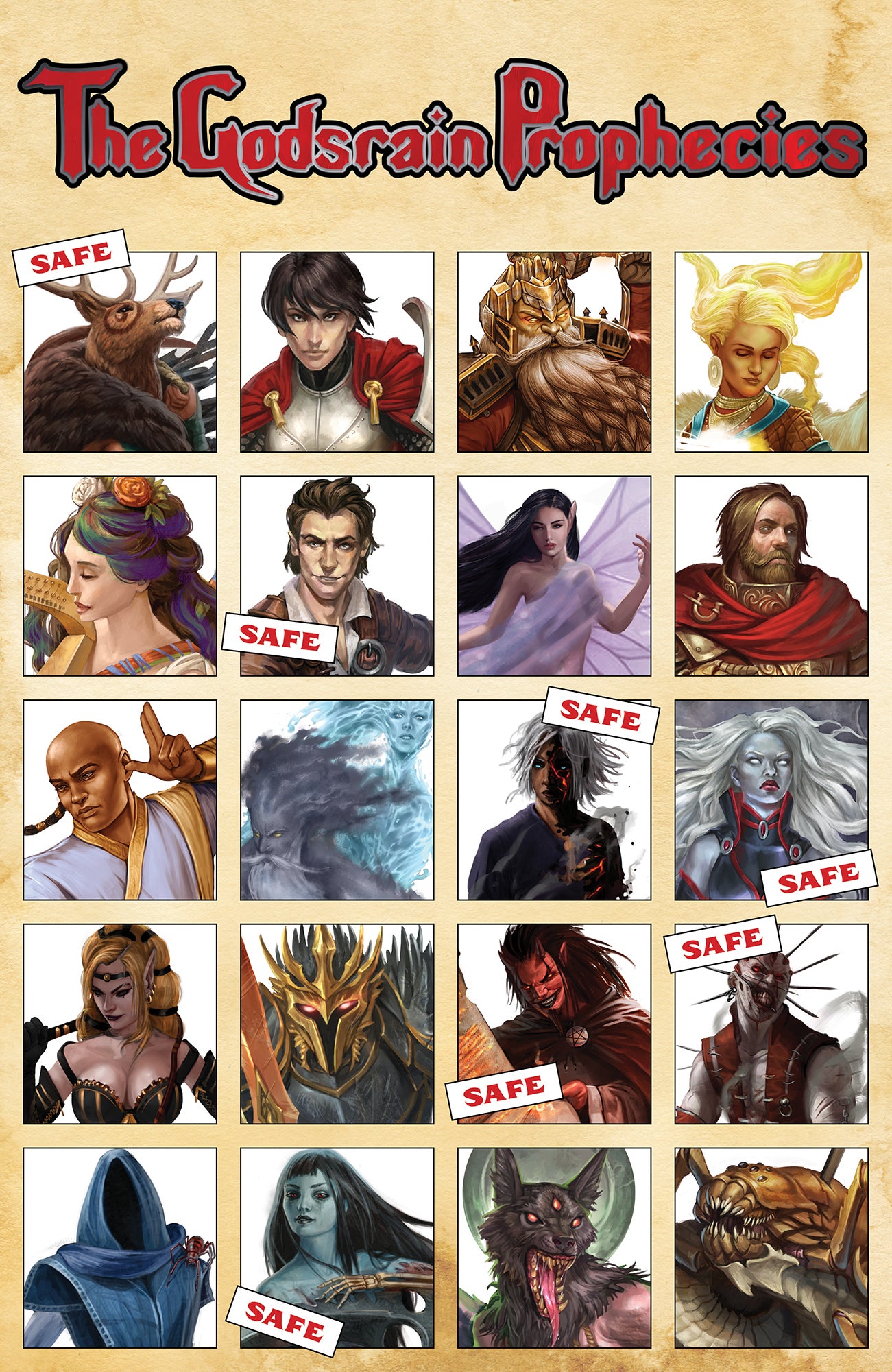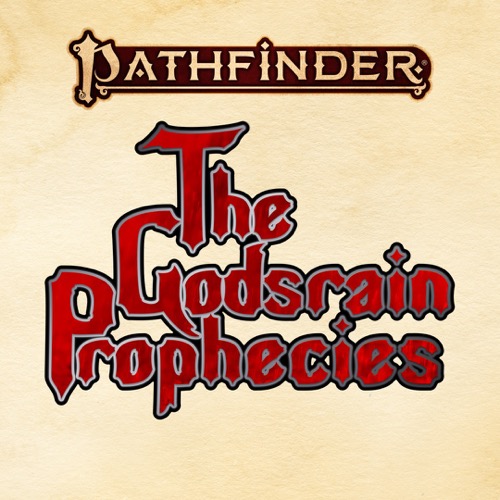Something that I have been mulling over for some time (but have yet to mention in these annotations) is the naming of the Godsrain Prophecies. By the time I first heard of them, they had already been given that title, but nothing I have read so far has given me any indication as to how or why. Personally, I would never presume to name a collection of this potential impact and importance without a very clear reason, lest I end up in a repeat of the Fatal Four disaster. (To think that one scribe’s decision to include a bit of wordplay in their recounting of a minor historical prophecy would lead to not one but two assassinations is truly beyond the pale!) Issues like this are the reason that Lorminos insisted I read Notorious Names and Narrative Novelties: Navigating the Nuance of Nomenclature early on in my studies (a book that could easily have been 150 pages instead of over 700, in my personal opinion). While I must make reading these prophecies a priority, I will also endeavor to track down the origin of the word Godsrain. For one thing, it is possible there was a mistaken transcription somewhere along the line. Perhaps they should instead be known as the God’s Reign Prophecies, alluding to the end of a specific god’s reign? It is something to at least consider.
–Yivali, Apprentice Researcher for the Lady of Graves
The “Death” of Zon-Kuthon
Shelyn has tried countless times to touch the heart of Zon-Kuthon, but in the end her music is what dooms the Midnight Lord. He’s long ignored his sister’s tears, no matter how they stream or pool, collecting any that he can and using them as salt to rub into followers’ wounds. Her pleading declarations he considers almost background noise, a counterpoint that makes the pain that echoes through the Netherworld sound that much more divine. But when she finds the beauty in the way his Kuthites scream and whimper, weaves together suffering into a string of rousing chords, builds melodies from dripping blood and rhythms from a clanging chain? Only she could find the art in all the suffering he wields, a dulcet murmuring that calls out from an orchestra of pain. Dou-bral, brother, I love you still. Dou-bral, come back to me.
With newfound strength, Dou-bral returns, soul breaking through its cage of bones and kicking out the usurper who’d lived beneath his skin. But even free he’s trapped inside a body built for cruelty, his face a mask of agony that tells a brutal story—scars and cries and sharpened blades, blood and tears and pain. The anguish he has known and caused, the torment Zon-Kuthon embraced—how can he reconcile himself with all he now remembers? He tries to flee back to his cell, to turn back into what he was, but Zon-Kuthon is memory now and only he remains.
Dou-bral can feel divinity like sparks beneath his fingertips, but with all that he’s done and been, he cannot now reward himself and let himself play god. He takes the power in his hands (so good now at destroying things) and rips it from his very being, leaving something more than man but less than deity. He stumbles from the Netherworld, his ears ringing with tortured screams (most of which are not his own), and makes his way to Pangolais, as if Zon-Kuthon’s capital will help him understand the things his other self has done. And when Shelyn walks next to him, her arm outstretched in kindness, the glaive she’d taken from him offered up with open hands, he turns his back and walks away, her music souring in his ears, reminding him of every chain he used to break their father.
Art and beauty pay a price for all that Shelyn’s sacrificed—the nightmares that disturbed her rest as she crafted a song of pain, the knowledge that Dou-bral is back but still wrapped up in suffering, the loss she feels from victory that’s nothing like she’d hoped. In theaters and galleries, on stage and page and instrument, creative minds start struggling—the colors dim, the music fades, the movements don’t flow smoothly—and lovers’ disillusions grow as nothing feels the way it was, until the disappointment drives some life-long pairs apart, an echo of a sadness that she cannot seem to shake.
Dou-bral’s other flesh and blood, the spirit-wolf turned Prince in Chains, roams the grounds of Xovaikain, trying to fill the absence that his son has left behind. But for all his vicious howling, what is left of Thron is not a god, and soon two new contenders come with plans to claim the Netherworld—Asmodeus who wants to bring new pain to the unworthy, adding a few new items to the tools he has for torment, and Iomedae, who seeks to free the souls still left within the realm, turning their search for pain into a sacrifice for glory. Neither willing to back down, they fortify positions, preparing for a battle that will change the Netherworld.
Far from the squabbling of the gods, Dou-bral travels through Nidal, hoping that he will find some path to redemption. Instead, he watches Cheliax, no longer held by ancient pact to stay within its borderlines, begin to take Nidalese lands, while members of the Umbral Court each claim to be Zon-Kuthon’s heir and stab each other in the back to claim his legacy.

Is the tainting of love and beauty worth Shelyn’s sacrifice if the shadow her brother’s replacement leaves behind remains to darken the world?
I will be completely honest here: Zon-Kuthon terrifies me! Always has. And yet this prophecy wasn’t scary at all. At least not to me. My Lady, I know, fears little, but I have been feeling the whole set of emotions during these annotations—terrified one minute and smiling the next. I truly thought I would be shivering after reading this, but I think I feel more sad than anything. Miss Shelyn trying so hard to free her brother and achieving her goal, only for him to reciprocate no love? It almost reminds me of my role in collecting these prophecies. I have wanted to be a part of something big to show my Lady how I can be of help to her for some time, and yet that means collecting a group of so-called prophecies that could be devastating in the wrong hands. It is odd to think of the gods having the same types of problems that the rest of us sometimes do. We revere them, and yet, especially as I read these prophecies, they seem more… mortal somehow? Or not. I hope that doesn’t sound too disrespectful. Best to leave this line of thought behind and move on to the next prophecy.
About the Author
Erin Roberts has been thrilled to be able to contribute a few small threads to the fabric of Golarion in the pages of books like Lost Omens Firebrands, Lost Omens Highhelm, and Lost Omens Travel Guide. In addition to her work for Paizo, she freelances across the TTRPG world (and was selected as a Diana Jones Award Emerging Designer Program Winner in 2023), has had fiction published in magazines including Asimov’s, Clarkesworld, and The Dark, and talks about writing every week on the Writing Excuses podcast. Catch up with her latest at linktr.ee/erinroberts.







